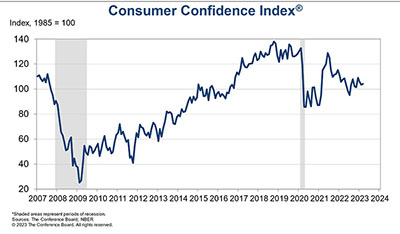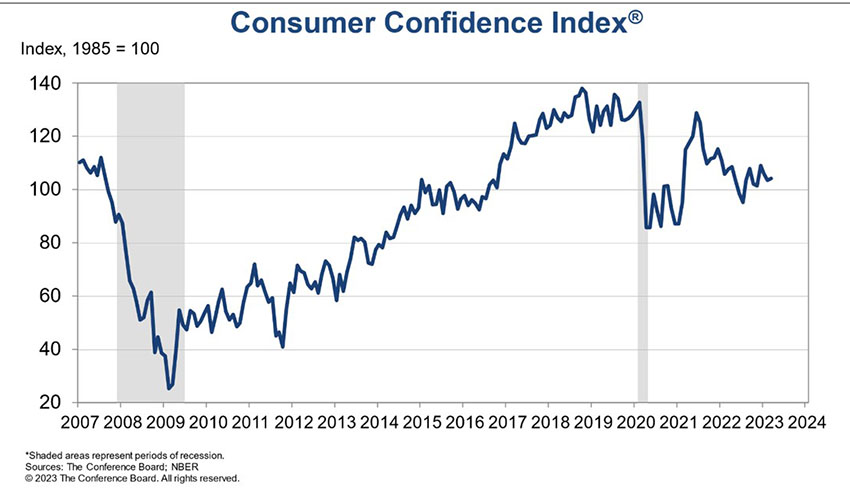
March Consumer Confidence Up Despite…Everything

Despite an interesting few weeks that have seen several bank failures, persistent inflation, a stunted housing market and prospects of higher unemployment, consumers apparently felt unfazed, according to The Conference Board, New York.
The monthly Consumer Confidence Index increased slightly in March to 104.2, up from 103.4 in February. The Present Situation Index—based on consumers’ assessment of current business and labor market conditions—decreased to 151.1 from 153.0 last month. The Expectations Index—based on consumers’ short-term outlook for income, business, and labor market conditions—ticked up to 73.0 from 70.4 in February (a slight upward revision). However, for 12 of the past 13 months—since February 2022—the Expectations Index has been below 80, the level which often signals a recession within the next year.

“Driven by an uptick in expectations, consumer confidence improved somewhat in March, but remains below the average level seen in 2022 (104.5). The gain reflects an improved outlook for consumers under 55 years of age and for households earning $50,000 and over,” said Ataman Ozyildirim, Senior Director of Economics with The Conference Board.
“Consumers may not love the present conditions, but a slightly more upbeat take on where things are headed was enough to give overall confidence a nudge in the right direction in March,” said Tim Quinlan, Economist with Wells Fargo Economics, Charlotte, N.C. The banking crisis is not high on the list of consumer worries at present.”
In a special question this month, the Consumer Confidence Survey asked about consumers’ spending plans on services over the next six months. The results show consumers plan to spend less on highly discretionary categories such as playing the lottery, visiting amusement parks, going to the movies, personal lodging and dining. However, they say they will spend more on less discretionary categories such as health care, home or auto maintenance and repair, and economical entertainment options such as streaming. Spending on personal care, pet care and financial services such as tax preparation is also likely to be maintained.
The report said consumers’ assessment of current business conditions worsened in March: 18.4% of consumers said business conditions were “good,” up slightly from 18.0%. However, 19.3% said business conditions were “bad,” up from 17.4%.
Consumers’ appraisal of the labor market was less favorable: 49.1% of consumers said jobs were “plentiful,” down from 51.2%, while 10.3% of consumers said jobs were “hard to get,” the same as last month.
Consumers became slightly less pessimistic about the short-term business conditions outlook in March: 15.5% of consumers expect business conditions to improve, up from 14.6%, while 18.5% expect business conditions to worsen, down from 21.6%.
Consumers’ assessment about the short-term labor market outlook was slightly more positive: 15.0% of consumers expect more jobs to be available, up from 14.5%, while 19.9% anticipate fewer jobs, down from 21.2%.
Consumers’ short-term income prospects was, on balance, less upbeat: 14.9% of consumers expect their incomes to increase, up from 14.4% last month. On the contrary, 13.6% expect their incomes will decrease, up from 11.6% last month.
